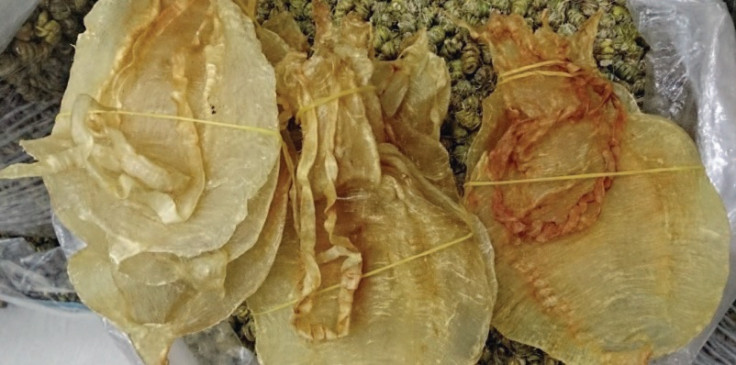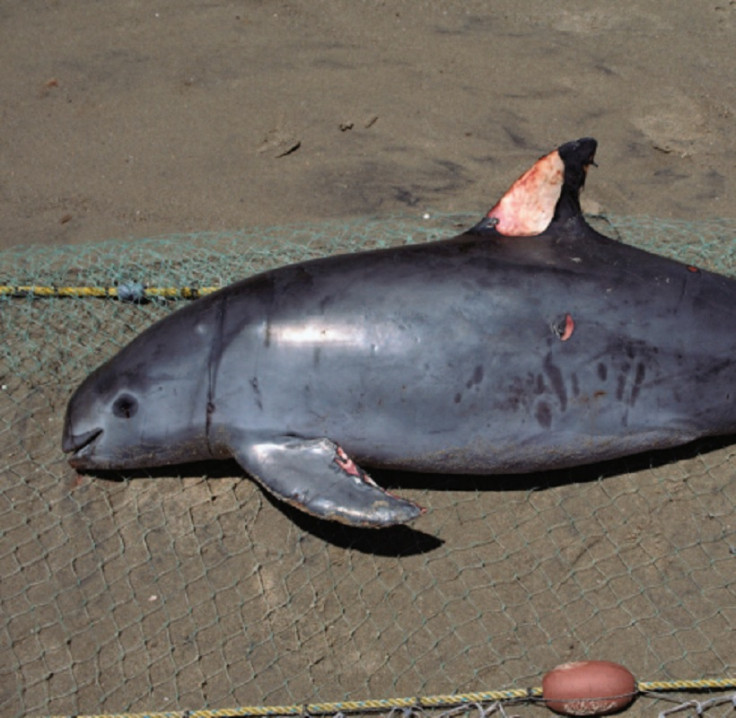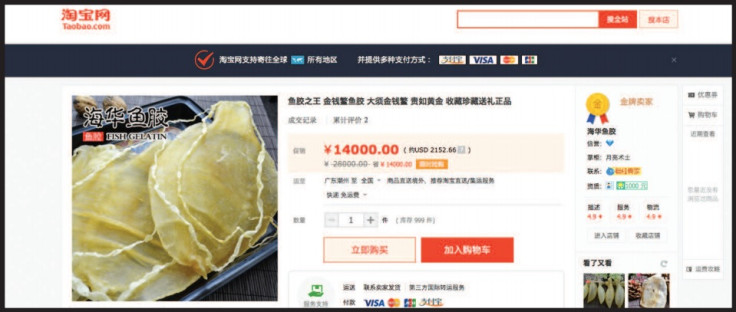Aquatic cocaine: Demand for dried totoaba fish bladder 'maw' pushing two species to extinction

The demand for dried fish bladder – dubbed 'aquatic cocaine' because of the huge prices it commands – has surged in recent years and is driving two species to extinction. Totoaba fish swim bladder, known as maw, can reach around $8,500 (£6,000) per kg in Hong Kong and China, where it is a traditional seafood in the same vein as shark fin, sea cucumber and abalone. It is thought the fish has medical benefits, but scientific studies supporting this are lacking.
A recently published report by the Environmental Investigation Agency (EIA) looked at the recent resurgence in demand for maw, finding it is pushing both the critically endangered totoaba and vaquita porpoise to extinction. The latter is suffering as a result of collateral damage – totoaba is found in the Upper Gulf of California, Mexico, where the last surviving vaquita are being snared and killed in the nets used to catch the fish.
It calls for an urgent crackdown on the illegal trade. Clare Perry, leader of EIA's Oceans Campaign, said: "The vaquita's extinction clock stands at one minute to midnight and the species is being pushed into oblivion by the demand of a relatively small number of Chinese consumers of totoaba maw. Less than 100 vaquita are left – and the clock is still ticking."

Aquatic cocaine
Totoaba is a large marine fish that can grow up to two metres in length, weigh up to 100kg and live as long as 25 years. It is found only in the central and northern Gulf of California. At the start of the 20<sup>th century, it was the Gulf's most important fishery, with its swim bladder being in high demand in China and among Chinese communities in California.
However, rampant overfishing, illegal fishing and habitat degradation led to it being listed as critically endangered and trade of totoaba is now illegal under US and Mexican law. While there were some signs of recovery, "poaching significantly increased at the beginning of 2013", the report found.
Demand for maw
Maw is produced from a variety of species, with around 34 different types. Larger and thicker swim bladders are generally more valuable, as are certain species. "The recent resurgence in the illegal trade in totoaba is thought to be connected to its perceived kinship to the giant yellow croaker or Chinese bahaba (Bahaba taipingensis), a highly valued sciaenid that has been overfished to such an extent it is listed as critically endangered by the IUCN," EIA said.
Both bahaba and totoaba are known as 'golden coin maw' or 'money maw' because of their high value. This is attributed to their rarity and supposed medicinal properties. "As bahaba maws rarely come to market, and those that do are usually older specimens, totoabas have replaced bahabas as the king of fish maws, leading to a massive increase in illegal fishing in Mexico."
A global trade

The EIA report notes that most of the reported seizures have taken place in areas of the US and Mexico, with far fewer being reported in the consumer markets in Hong Kong and mainland China. The report authors carried out investigations in markets in these areas. In Guangzhou, they found traders were aware totoaba sales were illegal but, found maw openly on sale in six of the 12 shops surveyed. Hong Kong traders were found to be more guarded, but prices were higher. Researchers also found many online traders, with interest from buyers in South America, Asia, the US and Mexico.
The team also found the price of illegal totoaba maw had peaked in 2012, with an oversupply leading to devaluation. This, however, appears to have led to traders holding onto stock in the belief there will be a future hike in prices. If this is the case, the EIA warns the survival of both totoaba and vaquita are at serious risk.
Extinction threat
The report concludes: "Traders in Guangzhou are holding on to available stock, and are likely seeking to control the release of maws on to the market to manipulate totoaba maw prices back to previous levels. If this strategy is successful, the increase in market value would generate a second wave of stock piling in totoaba maws, resulting in increased illegal fishing for totoaba in Mexico with devastating impacts on the vaquita."
"The Government of Mexico has appealed to the Parties to CITES to collaborate in efforts to enforce the Appendix I listing of totoaba. CITES must now send an unequivocal message that the illegal trade in totoaba fish maw is threatening not just one, but two, critically endangered species, and that increased and sustained enforcement efforts are required."
© Copyright IBTimes 2024. All rights reserved.






